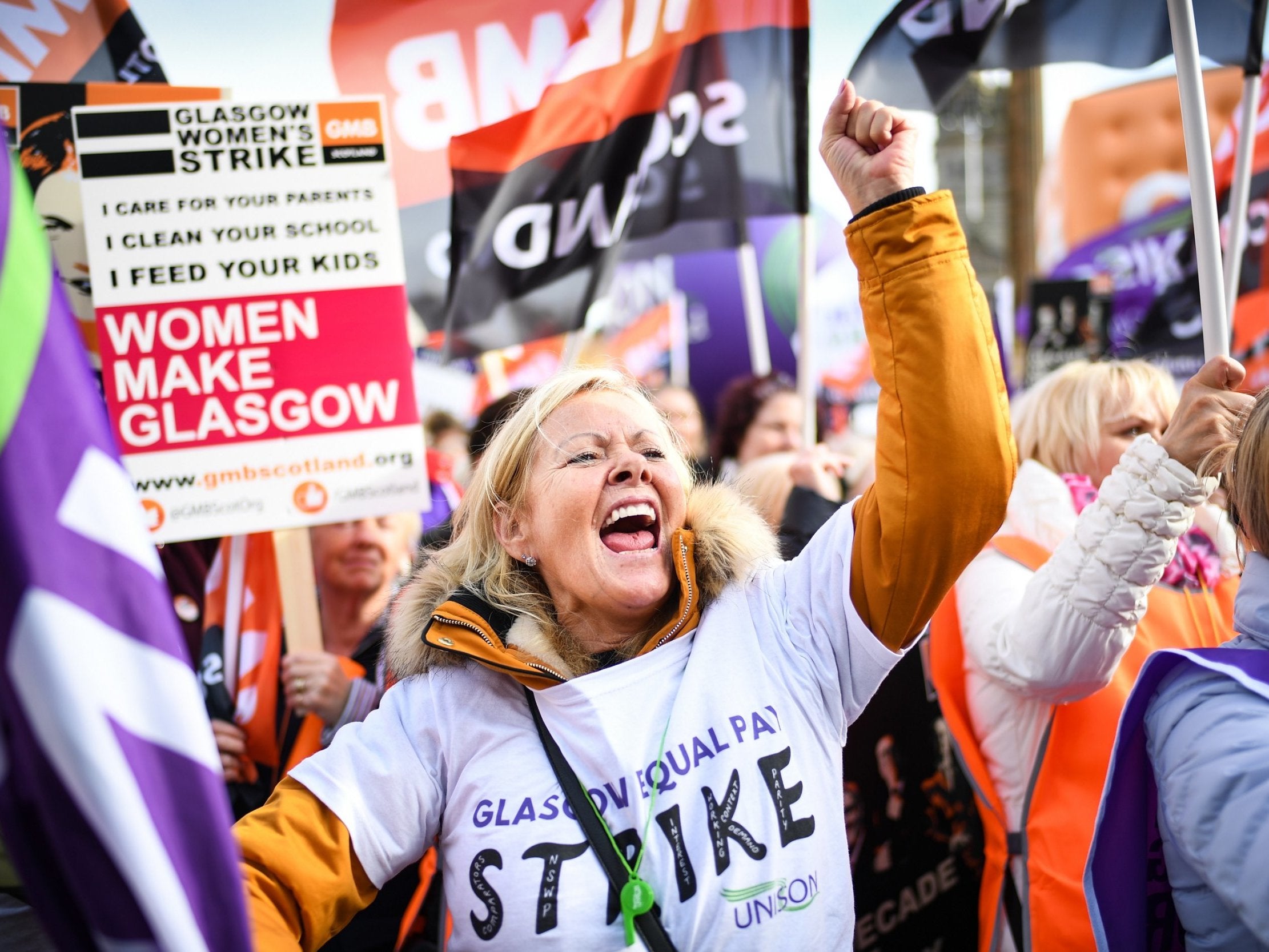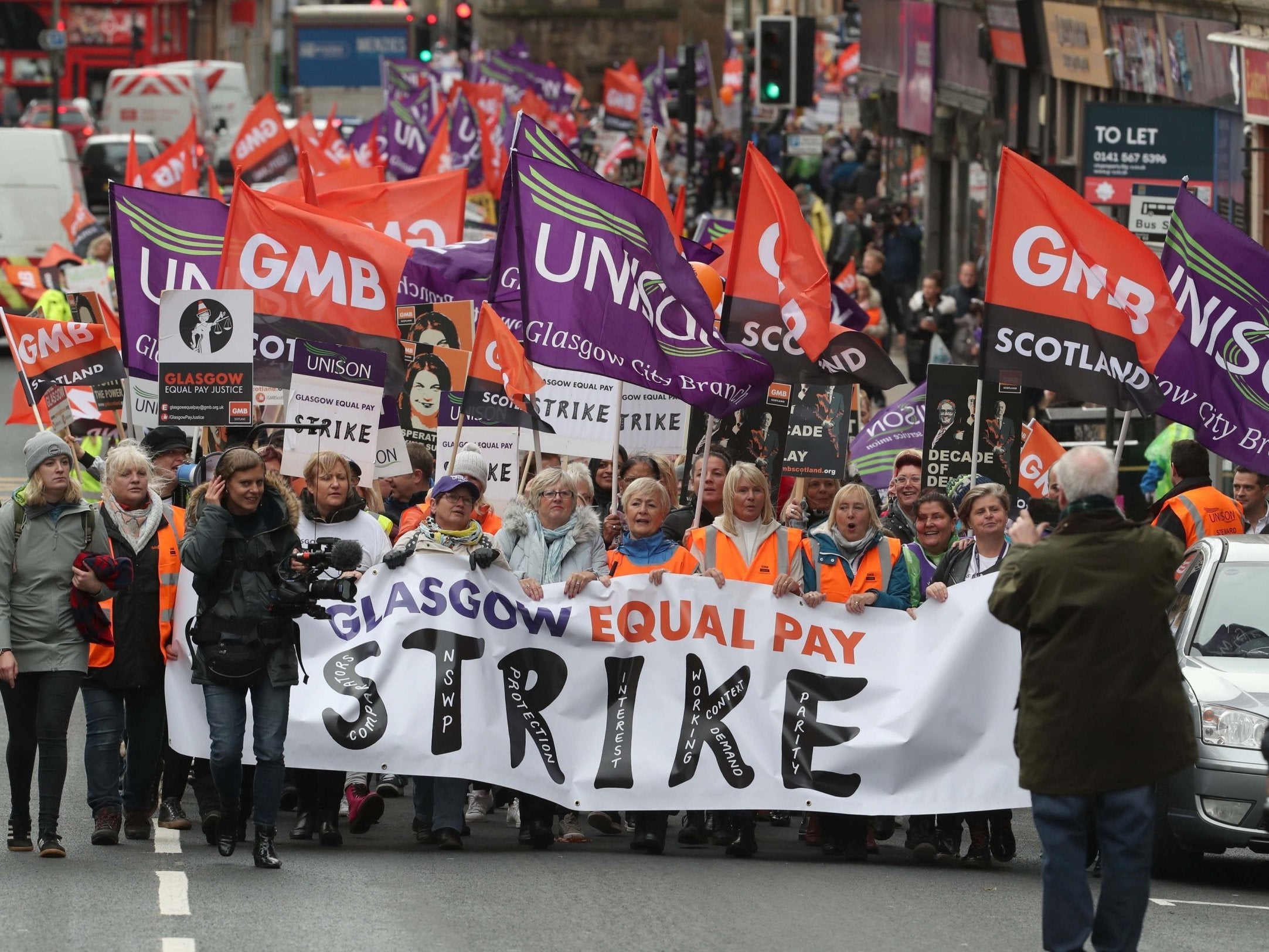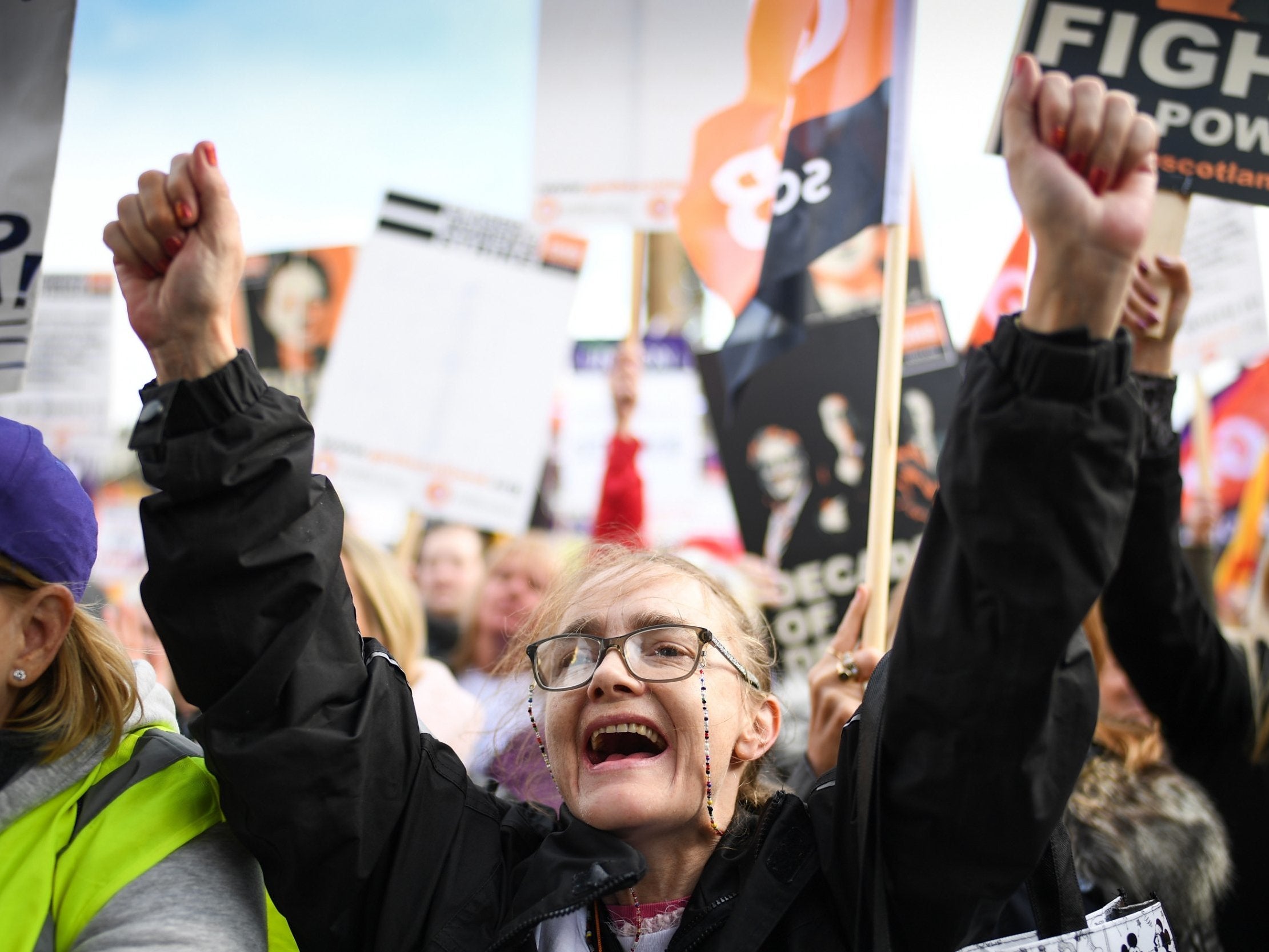Glasgow strike: Thousands of women bring city ‘to standstill’ in dispute over equal pay
Union calls disparity between salaries of male and female staff ‘a modern-day scandal’

Your support helps us to tell the story
From reproductive rights to climate change to Big Tech, The Independent is on the ground when the story is developing. Whether it's investigating the financials of Elon Musk's pro-Trump PAC or producing our latest documentary, 'The A Word', which shines a light on the American women fighting for reproductive rights, we know how important it is to parse out the facts from the messaging.
At such a critical moment in US history, we need reporters on the ground. Your donation allows us to keep sending journalists to speak to both sides of the story.
The Independent is trusted by Americans across the entire political spectrum. And unlike many other quality news outlets, we choose not to lock Americans out of our reporting and analysis with paywalls. We believe quality journalism should be available to everyone, paid for by those who can afford it.
Your support makes all the difference.Hundreds of schools and nurseries in Glasgow are closed and home care services faced disruption as council workers staged one of Britain’s biggest strikes over equal pay.
The walkout – which involves more than 8,000 workers – started at 7am on Tuesday and follows years of legal disputes between unions and Glasgow City Council (GCC) over claims that staff in female-dominated roles, such as cleaning, were underpaid.
Some women claim they made up to £3-an-hour less than those in male-dominated roles, such as bin collections. Some women are said to have been paid up to £4,000-a-year less than male counterparts.
Thousands of female workers are proceeding with claims against the council following a court of session ruling last year.
Members of the GMB and Unison unions are striking amid a “lack of progress” on equal pay claims from thousands of female workers, the unions said.
The council said the 48-hour industrial action over equal pay was unnecessary and that it hoped to reach a settlement in the coming months with payouts to begin in the next financial year.
Unions said they were concerned action could be taken against refuse and street-cleaning workers if they declined to cross picket lines.
The GCC said all early year establishments, additional support for learning schools and mainstream primary schools will close on both days, though all mainstream secondary schools will remain open.

Home care services for around 6,000 people are affected by the strike which is one of the biggest peacetime industrial actions seen in Glasgow.
Rhea Wolfson, of GMB Scotland, said the action aimed to bring the city to a “standstill” to make progress with negotiations.
Anna Murray, a worker on the picket line at The Mitchell Library, said: “We have waited 10 years for equal pay and the council doesn’t seem to be doing anything to pay it so we’ve gone out on strike in support of getting our equal pay paid. I just feel that we’re very underpaid for the work that we do.”
The cleaning supervisor at the large public library, who has worked there for 25 years, added: “We hope that the council speed things up and gets equal pay for the people that are waiting for it.”

The workers are striking over a long-running row over equal pay.
The council adopted the Workforce Pay and Benefit Review (WPBR), implementing its job evaluation-based pay and grading system in 2006 with the intention of making sure men and women got equal pay for jobs of the same value.
But some women claim they were paid £3-an-hour less than men in roles which were similarly graded. In May 2017, the Court of Session ruled the WPBR discriminated against female workers.
The council decided it would not appeal the decision of the court and would commit to settling the outstanding equal pay claims and bringing in a new system.
After decades of Labour rule, the SNP became the biggest party on the GCC in the same month. In January 2018, the council said it hoped to resolve the dispute via negotiations.
However, union members were incensed by the absence of progress, announcing they would strike earlier this month.
Up to 12,000 people are making equal pay claims - some of which date back 12 years - and it is believed it could wind up costing hundreds of millions of pounds to settle.
The local authority said it had looked at all alternatives to stop the strike.
GCC leader Susan Aitken criticised the strike and said it would have a “devastating impact”.
“There is no need for it. They won their case the day that the SNP was elected to lead the GCC and we have been working ever since then to deliver them justice,” she told BBC Radio Scotland.
“We are extremely close to it and I am confident that they will get the settlement that they are entitled to and we will start paying out in the next financial year.”
Mandy McDowall, of Unison, said: “It is a modern-day scandal that nearly 50 years on from the Equal Pay Act being introduced, we find ourselves standing alongside thousands of women who are being discriminated against by one of the UK’s largest councils.
“These women are the lifeblood of Glasgow, they carry out vital roles across the city – cleaning, caring, educating and looking after some of the most vulnerable people in our society. They are the cogs that keep our city turning, yet their roles remain chronically undervalued. Strike action isn’t a decision these women have taken lightly but after months of empty promises, they have been left with no choice.”
The council said the way union leaders have dealt with the strike has been “hugely disappointing”. A spokesperson added: “There has been absolutely no meaningful effort from the unions to work with us and their membership to ensure that life and limb cover will be in place.”
The GCC sent letters to those affected telling them their care will be withdrawn for two days during the strike.
Nicola Sturgeon, the Scottish first minister, said she had “nothing but admiration for the women involved”.
Join our commenting forum
Join thought-provoking conversations, follow other Independent readers and see their replies
Comments